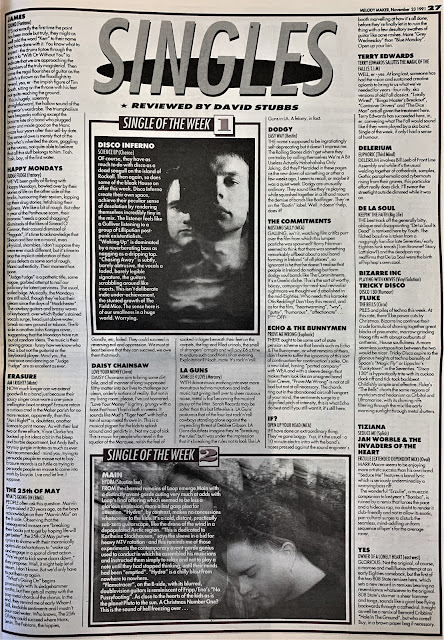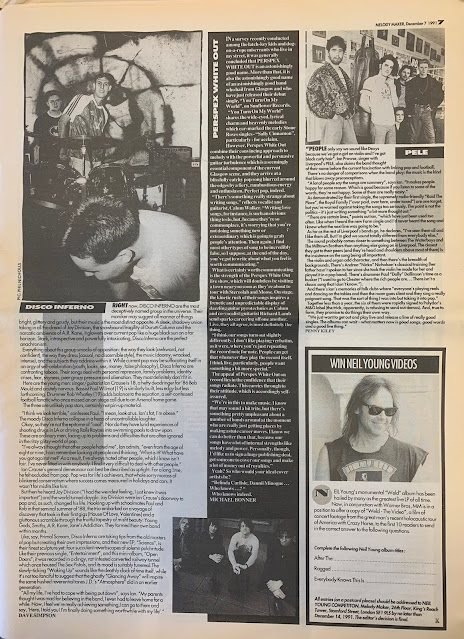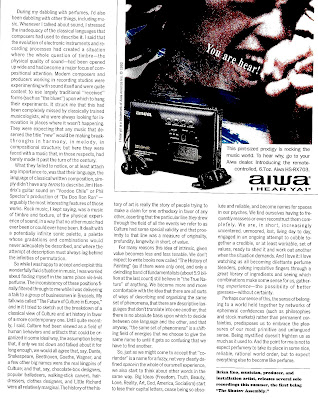Vladimir Nabokov's opinions on various writers, culled from Strong Opinions.
Auden, W. H. Not familiar with his poetry, but his translations contain deplorable blunders.
Austen, Jane. Great.
Balzac, Honoré de. Mediocre. Fakes realism with easy platitudes.
Barbusse, Henri. Second-rate. A tense-looking but really very loose type of writing.
Barth, John.
"Lost in the Funhouse." A particular favorite. Lovely swift speckled imagery.
Beckett, Samuel. Author of lovely novellas and wretched plays.
Molloy. Favorite work by Beckett.
Malone Dies. A favorite work by Beckett.
The Unnamable. A favorite work by Beckett.
Bely, Andrei.
Petersburg. Third-greatest masterpiece of 20th century prose. A splendid fantasy.
Bergson, Henri. A favorite between the ages of 20 and 40, and thereafter.
Blok, Alexander. A favorite between the ages of 10 and 15, and thereafter. Passionately fond of his lyrics, but his long pieces are weak.
The Twelve. Dreadful. Self-consciously couched in a phony "primitive" tone, with a pink cardboard Jesus Christ glued on at the end.
Borges, Jorge Luis. A favorite. How freely one breathes in his marvelous labyrinths! Lucidity of thought, purity of poetry. A man of infinite talent.
Brecht, Bertolt. A nonentity, means absolutely nothing to me.
Brooke, Rupert. A favorite between the ages of 20 and 40, but no longer.
Browning, Robert. A favorite between the ages of 10 and 15, and thereafter.
Bryusov, Valery. Indifferent to his works.
Camus, Albert. Dislike him. Second-rate, ephemeral, puffed-up. A nonentity, means absolutely nothing to me. Awful.
Carroll, Lewis. Have always been fond of him. One would like to have filmed his picnics. The greatest children's story writer of all time.
Céline, Louis-Ferdinand. Second-rate. A tense-looking but really very loose type of writing.
Cervantes, Miguel de.
Don Quixote. A cruel and crude old book.
Cheever, John.
"The Country Husband." A particular favorite. Satisfying coherence.
Chekhov, Anton. A favorite between the ages of 10 and 15, and thereafter. Talent, but not genius. Love him dearly, but cannot rationalize that feeling.
Chernyshevsky, Nikolai. His fate is moving, but his works are risible.
Chesterton, G. K. A favorite between the ages of 8 and 14. Essentially a writer for very young people. Romantic in the large sense.
Conan Doyle, Arthur. A favorite between the ages of 8 and 14, but no longer. Essentially a writer for very young people. Romantic in the large sense.
Conrad, Joseph. A favorite between the ages of 8 and 14. Essentially a writer for very young people. Certainly inferior to Hemingway and Wells. Intolerable souvenir-shop style, romanticist clichés. Nothing I would care to have written myself. In mentality and emotion, hopelessly juvenile. Romantic in the large sense. Slightly bogus.
Dostoevsky, Fyodor. Dislike him. A cheap sensationalist, clumsy and vulgar. A prophet, a claptrap journalist and a slapdash comedian. Some of his scenes are extraordinarily amusing. Nobody takes his reactionary journalism seriously.
The Double. His best work, though an obvious and shameless imitation of Gogol's "Nose."
The Brothers Karamazov. Dislike it intensely.
Crime and Punishment. Dislike it intensely. Ghastly rigmarole.
Douglas, Norman. A favorite between the ages of 20 and 40, and thereafter.
Dreiser, Theodore. Dislike him. A formidable mediocrity.
Eliot, T. S. Not quite first-rate.
Emerson, Ralph Waldo. His poetry is delightful.
Faulkner, William. Dislike him. Writer of corncobby chronicles. To consider them masterpieces is an absurd delusion. A nonentity, means absolutely nothing to me.
Flaubert, Gustave. A favorite between the ages of 10 and 15, and thereafter. Read complete works between 14 and 15.
Forster, E. M. Only read one of his novels (possibly A Passage to India?) and disliked it.
Freud, Sigmund. A figure of fun. Loathe him. Vile deceit. Freudian interpretation of dreams is charlatanic, and satanic, nonsense.
Galsworthy, John. A formidable mediocrity.
García Lorca, Federico. Second-rate, ephemeral, puffed-up.
Gogol, Nikolai. Nobody takes his mystical didacticism seriously. At his worst, as in his Ukrainian stuff, he is a worthless writer; at his best, he is incomparable and inimitable. Loathe his moralistic slant, am depressed and puzzled by his inability to describe young women, deplore his obsession with religion.
Gold, Herbert.
"Death in Miami Beach." A particular favorite.
Gorky, Maxim. A formidable mediocrity.
Hawthorne, Nathaniel. A splendid writer.
Hellens, Franz. Very important.
La femme partagee. Like it particularly.
Hemingway, Ernest. A writer of books for boys. Certainly better than Conrad. Has at least a voice of his own. Nothing I would care to have written myself. In mentality and emotion, hopelessly juvenile. Loathe his works about bells, balls, and bulls.
The Killers. Delightful, highly artistic. Admirable.
The Old Man and the Sea. Wonderful. The description of the iridescent fish and rhythmic urination is superb.
Housman, A. E. A favorite between the ages of 20 and 40, and thereafter.
Ilf and Petrov. Two wonderfully gifted writers. Absolutely first-rate fiction.
Ivanov, Georgy. A good poet but a scurrilous critic.
James, Henry. Dislike him rather intensely, but now and then his wording causes a kind of electric tingle. Certainly not a genius.
Joyce, James. Great. A favorite between the ages of 20 and 40, and thereafter. Let people compare me to Joyce by all means, but my English is patball to Joyce's champion game. A genius.
Ulysses. A divine work of art. Greatest masterpiece of 20th century prose. Towers above the rest of Joyce's writing. Noble originality, unique lucidity of thought and style. Molly's monologue is the weakest chapter in the book. Love it for its lucidity and precision.
A Portrait of the Artist as a Young Man. Never liked it. A feeble and garrulous book.
Finnegans Wake. A formless and dull mass of phony folklore, a cold pudding of a book. Conventional and drab, redeemed from utter insipidity only by infrequent snatches of heavenly intonations. Detest it. A cancerous growth of fancy word-tissue hardly redeems the dreadful joviality of the folklore and the easy, too easy, allegory. Indifferent to it, as to all regional literature written in dialect. A tragic failure and a frightful bore.
Kafka, Franz.
The Metamorphosis. Second-greatest masterpiece of 20th century prose.
Kazantzakis, Nikos. Second-rate, ephemeral, puffed-up.
Keats, John. A favorite between the ages of 10 and 15, and thereafter.
Khodasevich, Vladislav. The greatest Russian poet of his time.
Kipling, Rudyard. A favorite between the ages of 8 and 14. Essentially a writer for very young people. Romantic in the large sense.
Lawrence, D. H. Second-rate, ephemeral, puffed-up. Mediocre. Fakes realism with easy platitudes. Execrable.
Lowell, Robert. Not a good translator. A greater offender than Auden.
Mandelshtam, Osip. A wonderful poet, the greatest in Soviet Russia. His poems are admirable specimens of the human mind at its deepest and highest. Not as good as Blok. His tragic fate makes his poetry seem greater than it actually is.
Mann, Thomas. Dislike him. Second-rate, ephemeral, puffed-up.
Death in Venice. Asinine. To consider it a masterpiece is an absurd delusion.
Poshlost. Mediocre, but anyway plausible.
Maupassant, Guy de. Certainly not a genius.
Maugham, W. Somerset. Mediocre. Fakes realism with easy platitudes. Certainly not a genius.
Melville, Herman. Love him. One would like to have filmed him at breakfast, feeding a sardine to his cat.
Marx, Karl. Loathe him.
Milton, John. A genius.
Odoevsky, Vladimir. Indifferent to his works.
Yury Olesha. Some absolutely first-rate fiction.
Orczy, Baroness Emmuska.
The Scarlet Pimpernel. A favorite between the ages of 10 and 15, but no longer.
Pasternak, Boris. An excellent poet, but a poor novelist.
Doctor Zhivago. Detest it. Melodramatic and vilely written. To consider it a masterpiece is an absurd delusion. Pro-Bolshevist, historically false. A sorry thing, clumsy, trivial, melodramatic, with stock situations and trite coincidences.
Pirandello, Luigi. Never cared for him.
Plato. Not particularly fond of him.
Poe, Edgar Allan. A favorite between the ages of 10 and 15, but no longer. One would like to have filmed his wedding.
Pound, Ezra. Definitely second-rate. A total fake. A venerable fraud.
Proust, Marcel. A favorite between the ages of 20 and 40, and thereafter.
In Search of Lost Time. The first half is the fourth-greatest masterpiece of 20th-century prose.
Pushkin, Alexander. A favorite between the ages of 20 and 40, and thereafter. A genius.
Eugene Onegin. A great poem. Walter Arndt's translation is abominable.
Queneau, Raymond.
Exercises de style. A thrilling masterpiece, one of the greatest stories in French literature.
Zazie. Very fond of it.
Ransom, John Crowe.
Captain Carpenter. Admire this poem.
Rimbaud, Arthur. A favorite between the ages of 10 and 15, and thereafter.
Robbe-Grillet, Alain. Great. A favorite. How freely one breathes in his marvelous labyrinths! Lucidity of thought, purity of poetry. Magnificently poetical and original.
Rolland, Romain. A formidable mediocrity.
Salinger, J. D. By far one of the finest artists in recent years.
"A Perfect Day for Bananafish." A great story. A particular favorite.
Sartre, Jean-Paul. Even more awful than Camus.
Nausea. Second-rate. A tense-looking but really very loose type of writing.
Schwartz, Delmore.
"In Dreams Begin Responsibilities." A particular favorite.
Schweitzer, Albert. Detest him.
Shakespeare, William. Read complete works between 14 and 15. One would like to have filmed him in the role of the King's Ghost. His verbal poetic texture is the greatest the world has ever known, and immensely superior to the structure of his plays as plays. It is the metaphor that is the thing, not the play. A genius.
Sterne, Laurence. Love him.
Sue, Eugène. Melodramatic, second-rate.
Tagore, Rabindranath. A formidable mediocrity.
Tolstoy, Aleksey. A writer of some talent with two or three science fiction stories or novels which are memorable.
Tolstoy, Leo. A favorite between the ages of 10 and 15, and thereafter. Read complete works between 14 and 15. Nobody takes his utilitarian moralism seriously. A genius.
Anna Karenina. Incomparable prose artistry. The supreme masterpiece of 19th-century literature.
The Death of Ivan Ilyich. A close second to Anna Karenina.
Resurrection. Detest it.
The Kreutzer Sonata. Detest it.
War and Peace. A little too long. A rollicking historical novel written for the general reader, specifically for the young. Artistically unsatisfying. Cumbersome messages, didactic interludes, artificial coincidences. Uncritical of its historical sources.
Turgenev, Ivan. Talent, but not genius.
Tyutchev, Fyodor. A great lyrical poet.
Updike, John. By far one of the finest artists in recent years. Like so many of his stories that it is difficult to choose one.
"The Happiest I've Been." A particular favorite.
Verlaine, Paul. A favorite between the ages of 10 and 15, and thereafter.
Verne, Jules.
Around the World in Eighty Days. A favorite between the ages of 10 and 15, but no longer.
Wells, H. G. A favorite between the ages of 10 and 15, and thereafter. A great artist, my favorite writer when I was a boy. His sociological cogitations can be safely ignored, but his romances and fantasies are superb. A far greater artist than Conrad. A writer for whom I have the deepest admiration.
The Passionate Friends. Better than anything any of Wells' contemporaries would produce.
Ann Veronica. Better than anything any of Wells' contemporaries would produce.
The Time Machine. Better than anything any of Wells' contemporaries would produce. Especially good.
The Country of the Blind. Better than anything any of Wells' contemporaries would produce. Especially good.
The Invisible Man. Especially good.
The War of the Worlds. Especially good.
The First Men on the Moon. Especially good.
Wilbur, Richard.
"Complaint." A piece of great poetry.
Wilde, Oscar. Rank moralist and didacticist. A favorite between the ages of 8 and 14. Essentially a writer for very young people. Romantic in the large sense.
Wolfe, Thomas. Second-rate, ephemeral, puffed-up.
Zabolotsky, Nikolai. Enormously gifted.
Zamyatin, Yevgeny. Indifferent to his works.
Zoshchenko, Mikhail. Some absolutely first-rate fiction.
















































